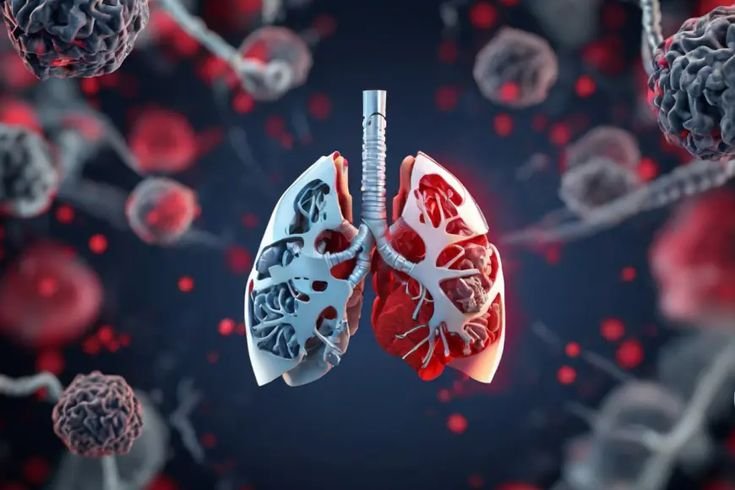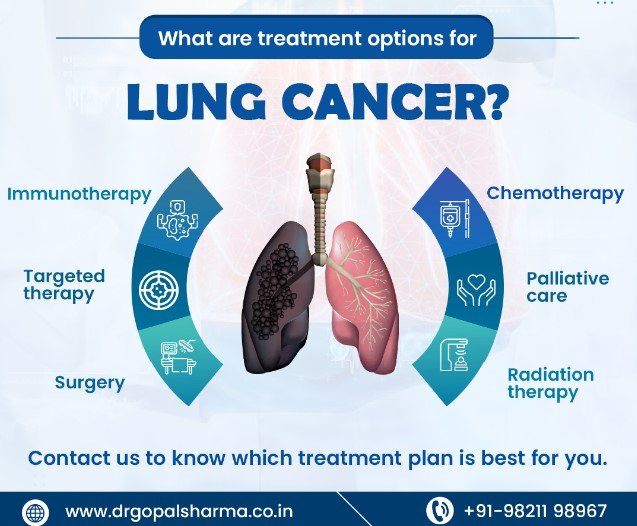
When facing lung cancer, choosing the right specialist can make all the difference. If you are searching for a trusted Lung Cancer Specialist Doctor in Delhi, Dr. Gopal Sharma is a name you can rely on. With over 23 years of experience in medical oncology, Dr. Sharma has earned his place as one of the best cancer specialists in Delhi. Known for his personalized and compassionate approach, he specializes in diagnosing and treating various cancers, including lung cancer, ensuring patients receive the highest level of care and support.
Looking for expert cancer care? Dr. Gopal Sharma, a renowned Lung Cancer Specialist Doctor in Delhi, brings over 23 years of experience in medical oncology. With an MBBS from SPMC Medical College, Bikaner, an MD in General Medicine from SMS Medical College, Jaipur, and a DM in Oncology from the Gujarat Cancer Research Institute, Ahmedabad, his credentials speak for themselves.
Dr. Sharma’s expertise in lung cancer treatment and his personalized, patient-first approach make him a top choice for those seeking quality care. As a leading Medical Oncologist in Ghaziabad, he combines advanced treatments with compassion to deliver exceptional outcomes and improve lives.
Dr. Gopal Sharma currently practices at MAX Healthcare & holds an experience 23+ Years as an Oncologist!
Lung cancer develops in the cells of the lungs and can spread to other parts of the body. There are two main types: non-small cell lung cancer and small cell lung cancer. Symptoms such as persistent cough, shortness of breath, chest pain, and unexplained weight loss often emerge in advanced stages. Early diagnosis by a Lung Cancer Specialist Doctor in Delhi like Dr. Sharma is critical to improving the chances of successful treatment.

Lung Cancer symptoms are often subtle in the early stages. If you notice any of the following, it’s vital to consult a Lung Cancer Specialist Doctor in Delhi for further evaluation:
▷ Persistent, worsening cough
▷ Shortness of breath
▷ Chest pain
▷ Coughing up blood or rust-colored sputum
▷ Unexplained weight loss
▷ Fatigue or weakness
▷ Recurring respiratory infections
Several factors increase the risk of developing lung cancer, including:

As a Lung Cancer Specialist Doctor in Delhi, Dr. Gopal Sharma specializes in the diagnosis and treatment of lung cancer, one of the most prevalent and aggressive forms of cancer. Lung cancer requires prompt, accurate diagnosis and a specialized treatment plan, which is exactly what Dr. Sharma provides. His expertise spans across all stages of lung cancer, including early-stage detection, advanced treatments, and palliative care.
Dr. Sharma offers a comprehensive range of treatments for lung cancer, including:
Beyond lung cancer, Dr. Gopal Sharma specializes in treating various cancers and related conditions, including:
Dr. Gopal Sharma, Principal Director & HOD of Medical Oncology at Max Institute of Cancer Care, has over 23+ years of expertise in cancer treatment. Recognized as the Leading Lung Cancer Specialist Doctor in Delhi, Dr. Sharma specializes in treating lung cancer using advanced targeted therapies and personalized care. His proficiency spans Breast, Thoracic, and Gynecologic Oncology, with a strong focus on hematological malignancies. Dr. Sharma’s dedication to providing comprehensive, patient-centered cancer care, combined with his use of the latest medical advancements, makes him a trusted and renowned oncologist in Delhi’s healthcare landscape.
Lung cancer is an aggressive disease, but with the expertise of a Lung Cancer Specialist Doctor in Delhi like Dr. Gopal Sharma, patients receive the highest standard of care. Dr. Sharma’s dedication to cutting-edge treatments, compassionate support, and personalized care makes him the right choice for those battling lung cancer.
The most significant risk factor for lung cancer is tobacco use, but other factors include prolonged exposure to harmful substances like asbestos, radon, and air pollution, as well as genetic predispositions and family history.
Yes, individuals at high risk, such as long-term smokers or those exposed to harmful substances, can undergo low-dose CT scans to detect lung cancer in its early stages, even before symptoms develop.
Yes, there are two main types of lung cancer: non-small cell lung cancer (NSCLC), which is more common, and small cell lung cancer (SCLC), which tends to grow and spread more quickly.
A common myth is that only smokers get lung cancer, but non-smokers can also develop the disease due to environmental or genetic factors. Another misconception is that lung cancer is always fatal, but early detection and advances in treatment have improved survival rates.
The best way to prevent lung cancer is to avoid smoking or quit if you're a smoker. Additionally, limiting exposure to secondhand smoke, reducing contact with carcinogens, and testing homes for radon gas can help lower the risk.
As a Lung Cancer Specialist Doctor, I often emphasize that the most common cause of lung cancer is smoking, responsible for the majority of cases due to the harmful chemicals in tobacco. However, non-smokers are also at risk, often from prolonged exposure to secondhand smoke, air pollution, or radon gas. Occupational hazards like asbestos and exposure to certain industrial chemicals can increase susceptibility. Genetic predisposition may also play a role in some individuals. Understanding these risk factors is essential for early prevention and effective management of lung cancer. Regular screenings are recommended, especially for high-risk groups.
As a Lung Cancer Specialist Doctor, diagnosing lung cancer typically involves a combination of medical history review, physical examination, and imaging tests. The process usually begins with a chest X-ray to detect any abnormalities. If something questionable is discovered, a CT scan is frequently performed for more detailed imaging. Further tests, such as a biopsy, where a small tissue sample is taken for analysis, and bronchoscopy, which involves looking inside the lungs using a flexible tube, are also commonly used to confirm the diagnosis and determine the stage of cancer.
As a Lung Cancer Specialist Doctor, I often get asked whether lung cancer can be prevented. While there is no guaranteed way to prevent lung cancer, certain lifestyle changes can significantly reduce the risk. Quitting smoking is the most important step, as smoking is the leading cause of lung cancer. Additionally, avoiding exposure to secondhand smoke, reducing environmental pollutants, and maintaining a healthy diet rich in fruits and vegetables can help lower the risk. Regular exercise and routine health check-ups also contribute to early detection and overall lung health.
This will close in 20 seconds
WhatsApp us